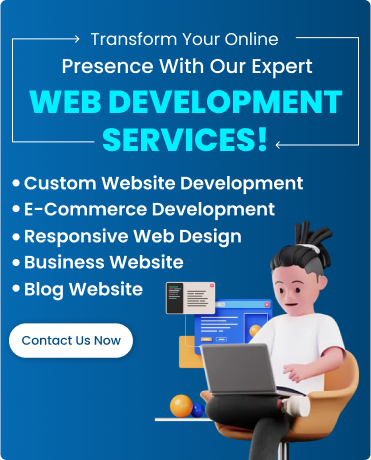Software development is the core of innovation in this fast-paced digital world. Software is developing systems, apps and programs for everything from mobile apps and websites to enterprise systems and AI There are thousands of types developed to solve real-world problems and enhance user experiences. Knowing the different types of software development is important for businesses and individuals who want to leverage technology.
If you are a startup looking to create your first product or an established company with plans to scale, the right software development agency can make a world of difference. So, if you want to learn the main software development types to understand which one works for you perfectly, what agency can deliver your vision, just read this ultimate guide!
1. Web Development
Web development is probably the most well-known types of software development for the average person. It is to create and develop websites and web applications that use internet browsers. It is generally subdivided into Front-end, Back-end and full-stack development categories. Why are front-end developers not effective? On the other hand, Back-end developers work with server-side logic, databases and APIs using languages such as Python, PHP, Ruby or Node. js. Full-stack developers are doers on both ends. Most of today’s things, ranging from e-commerce platforms to social media networks to online banking services would never stand without web development.
2. Mobile App Development
Mobile App building Shows the process of creating apps that run on mobile devices like smartphones and tablets. You can build these applications for the different operating systems like iOS and Android. Swift or Objective-C are generally used for iOS apps and Java or Kotlin are often used in Android development. There are cross-platform tools, such as Flutter, React Native and Xamarin, which can be used to create apps that run on both platforms from a single codebase. From fitness trackers to ride-sharing to mobile games With mobile devices now integral to daily life, mobile app development is an industry on the rise.
3. Desktop Software Development
Desktop applications are built on desktop operating systems like Windows, macOS and Linux. Unlike web and mobile apps, they don’t require a browser or internet connection to work (though some might have online capabilities). Examples are word processors, video editors, accounting tools and graphic design software. Developers generally use programming languages such as C++, C#, Java or Python depending on platform and application needs. With the advent of cloud-based solutions, the market for desktop applications has diminished while remaining a crucial requirement for memory-intensive processes and solutions for enterprise grade software.
4. Game Development
Game development is one of the most thrilling and creative types of software development. It includes video game development for consoles, computers and mobile equipment. Game Developers, Those building immersive, interactive experiences use platforms and engines such as Unity, Unreal Engine and Godot. They require a solid grip of graphics programming, physics and AI as well as storytelling. Game development is both an art and a technical skill, where designers, artists, writers and developers must work together to succeed. The gaming industry is huge and is only getting bigger and there is no shortage of opportunities out there for developers with a love of entertainment, technology and togetherness.
5. Embedded Systems Development
Embedded systems development deals with programming software for hardware devices that is not considered a computer. These devices can be anything from microwaves and washing machines to smartwatches and industrial machines. Because the platform needs to be fast and low on memory, embedded software is commonly written in C and sometimes C++. Developers in this area need to be familiar with hardware as well, that is they need to be well versed with microcontrollers, sensors and real-time operation systems (RTOS) and they work closely with that. With the growth of the Internet of things (IoT), embedded systems development is becoming ever more critical in building smarter, connected devices.
6. Cloud Computing Development
Cloud computing has transformed, how software is built and delivered. Cloud development is the process of creating the application in cloud platforms like AWS, Microsoft Azure, Google Cloud, etc. These apps are scalable, flexible and available from anywhere with an Internet connection. Cloud architecture, containerization (such as Docker and Kubernetes), serverless computing and CI/CD pipelines are just a few of the areas developers need to know. This era of development is vital for enterprises who want to cut costs on infrastructure whilst also striving for higher reliability and collaboration. It enables modern services like video streaming, cloud storage and SaaS.
7. DevOps Engineering
DevOps is not a new category of software development, rather a traditional and operational shift that embeds development (Dev) and operations (Ops). DevOps engineers work to mechanize the process of software delivery, which means making sure that the code can be published and thus, consumed quickly and reliably, from development to production. These involve processes such as Infrastructure automation, continuous testing, deployment automation and performance monitoring. Example tools contain Jenkins, Git, Docker, Terraform, etc. The main objective is to enable collaboration, speed and quality of software delivery. In agile development environments where the priority is on fast deployment and feedback, DevOps plays a very crucial role.
8. Security Software Development
As cyber threats surge, security software development has turned into an important specialization. Developers in this area make tools and systems that defend data, networks and applications from malicious attacks. Such tools can include antivirus, encryption, firewalls or intrusion finding systems. Developers in this domain require skills such as secure coding practices, ethical hacking and knowledge of cybersecurity protocols. Security dev isn’t simply creating defensive tools, it’s integrating security elements into all levels of software development, a process often referred to as DevSecOps.
9. Artificial Intelligence and Machine Learning Development
The leading edge of technology is artificial intelligence and machine learning (ML). Professionals in this area create algorithms that can learn from information, identify patterns and automate processes to the greatest extent possible. Some commonplace applications are recommendation systems, identifying objects in pictures, speech recognition and forecasting. It also involves the application of Python or R programming languages with TensorFlow, PyTorch and Scikit-learn libraries. Building AI/ML solutions requires knowledge and understanding of data science, algorithms and math. Seeing that so many businesses and government agencies are turning to AI to solve problems, there is a sharp increase in the number of professionals sought after in this sector.
10. API Development
The APIs (Application Programming Interfaces) serve as the fundamental framework of contemporary software interactions. The development of an API focuses on creating interfaces where various software systems can interact with each other. Developers create APIs that are either RESTful or GraphQL and offer their data and functionalities to other applications. For example, a payment gateway API enables online retailers to securely process transactions. API developers have a wide range of responsibilities which include securing, documenting and scaling the APIs. In the digital world where everything is connected, the development of APIs is extremely important for the smooth integration of applications, services and platforms.
Conclusion
As technology is ever-evolving, innovation will always require us to be at the forefront and request us to level up our process. Whether it’s for mobile apps, websites, enterprise systems or artificial intelligence, there are endless software types being created that will help in resolving real-world issues and improving user experiences. Software development is a broad field that includes various specializations.
Whether we are talking about a startup that is preparing to launch its first product, or a more established company looking for scales, an appropriate software development agency partner can be a turning point. This ultimate guide will cover the significant types of software development and assist you in figuring out which method agrees with your aims and how a reliable agency can turn your dreams into a reality.

Stay Up to Date
Get our newsletter

Table of Contents
Toggle



